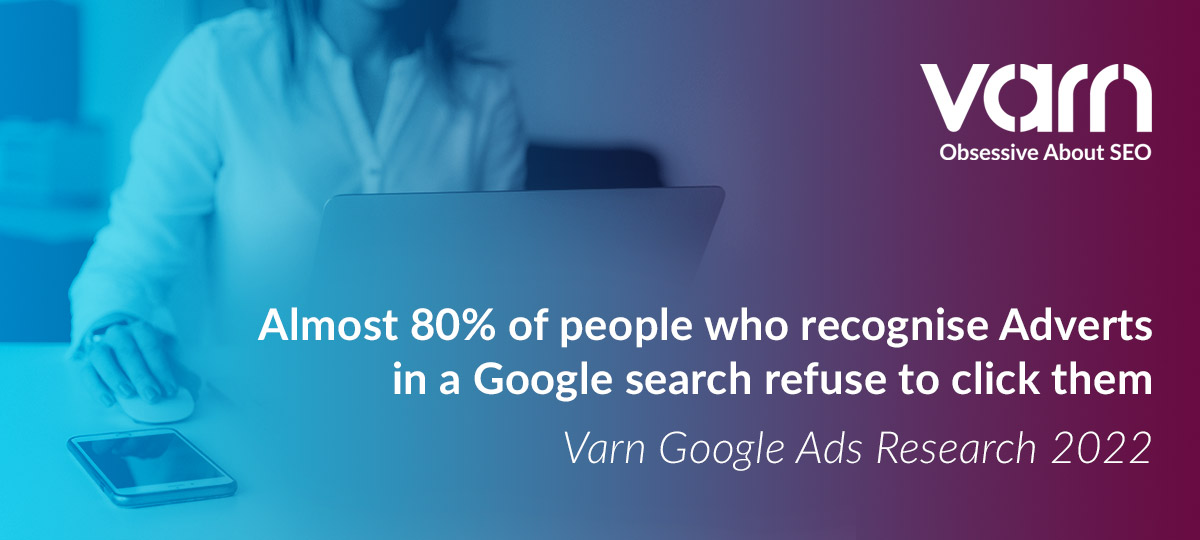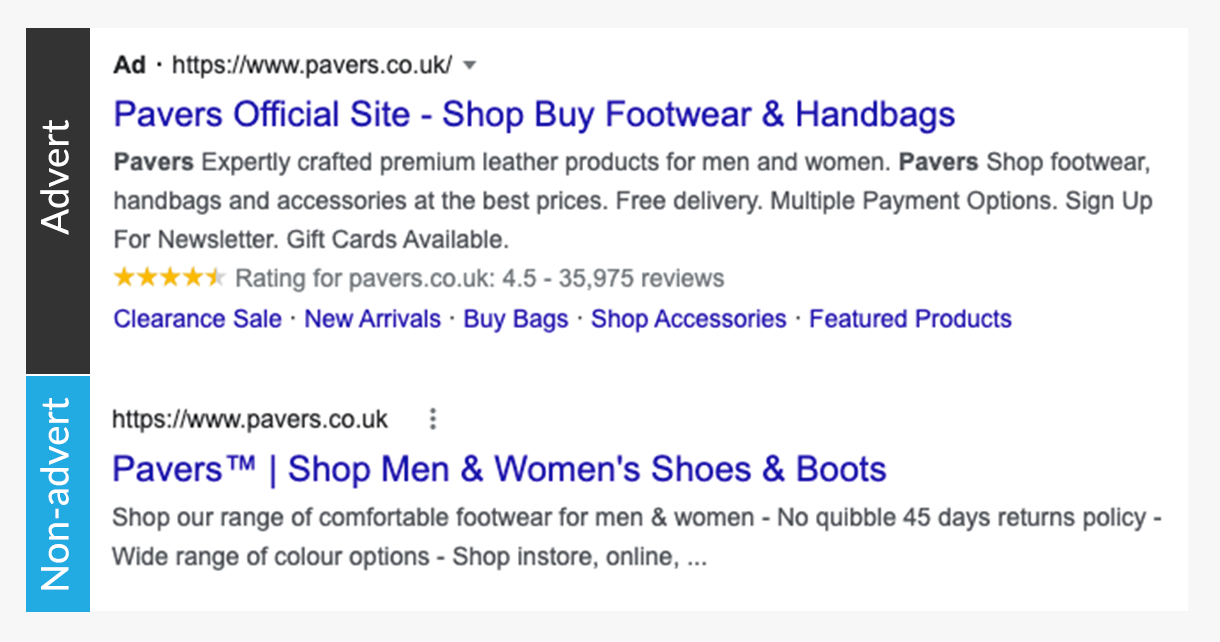
Our latest survey has found that most people (68.2%) do not recognise a Google Ad in their search results. This means that almost a third of us DO recognise the Adverts in our search results and almost 80% of those people (78.6%) will then refuse to click on the Ads.
Over the past six years , Varn have conducted research every six months to measure the degree to which people can recognise the Adverts within the Google Search results.
We work with our clients to hypothesise and evaluate holistic click through rates with and without the presence of a paid ads in the SERPs. Where possible we review the revenue per click generated by each channel in the context of search competition to identify the best search strategy. We are often reviewing data about click through rates on Adverts vs Organic listings, and we have always wondered who actually recognises a Google Ad when they search and what do they do then?
We all know how important advertising revenue is to Google. In 2021, Google’s ad revenue reached a staggering $148.9 billion. Add in YouTube advertising revenue and Google Networks advertising revenue, we have a total of £208.7 billion. This amounts to 81% of Google’s total revenue so, perhaps unsurprisingly, advertising and paid search is vital to Google. But how much do people recognise it’s advertising they see when they do a Google search?
We have been curious about this for some time and for the last 6 years, every six months in the UK, we have conducted a survey online asking over 1000 people across all age groups:
“Do you know which links on the Google search results page are paid adverts?”
Our research has highlighted that the majority of searchers (68.2%) still do not realise it is an Advert that is appearing at the top of their Google search results.

This is good news for advertisers, as this large proportion of searchers won’t be put off by anti-advertising perceptions, before clicking on your website. However, it does pose the question that if 68.2% don’t realise they are looking at an Advert, then 31.8% do recognise they are seeing Adverts in their SERPs.
Well, based on our latest findings, 25% of people do recognise it’s an Ad. They will then refuse to click on it. Only 6.8% of the people that recognise a Google Advert will then actually go on to click.
This means that 78.6% of the people that recognise Google Adverts, refuse to click on them!
This implies there is a large chunk of your potential market deliberately choosing to ignore your advert. With an estimated 3.5 billion searches per day in the UK alone, based on our findings, 31.8% of those searches, (1.1 billion) will know that there are Ads in their search results. Of those 1.1 billion searches, almost 80% of those searchers could be actively choosing not to click on your Ad. This is a large amount of people searching and making a conscious choice to ignore your Advert, precisely because it is an Ad.
Given we know these searchers will knowingly refuse to even look at your paid Ad, this means your business will need to try and engage with these people with other ‘search’ tactics. You simply can’t just throw budget at a paid media strategy alone, instead organic search will have an important role to play and a combined or hybrid search marketing strategy is needed.
From Google’s perspective they state that:
“Google’s first responsibility is to provide Search users with the most relevant possible results. If businesses were able to pay for higher rankings in the search results, users wouldn’t be getting the information they’re looking for.”
We examined how Google have presented Adverts to the searcher over time. Interestingly, since 2013, Google has changed it’s adverts over time to be less obvious. In the graphic below you can see how Google search Ads have evolved. The format and styling change frequently and it could be suggested that the graphic signposting of Adverts has become much more subtle over time and more in line with a standard organic listing.

When we look at our Varn research over the last 6 years, the ability to recognise an Advert hasn’t changed a great deal, even though theoretically people are getting wiser to how search engines work. It has remained between about 57% and 65% since 2017 and you can see how this may be influenced by the design of the Google Ad labelling which has since transformed to look more like regular Google listings. This year we see that figure at 68.2%, at a time when the Ad design really is very similar to an organic search listing.
Can you spot the difference…?
It really is not surprising that the majority (68.2%) of people still don’t recognise Ads, as if you line up a paid Advert and an organic search result and see how they actually look to a searcher, you can see there is not much difference at all:

We have also seen that Ads can often take up most of the page of a search result. Combine this with the subtle design cues used to indicate the Advert status, you can see why people may not understand they are looking at just Ads rather than organic search results.
A good example is, if you search something close to our heart…. ‘SEO agency Bristol’. As you will see the paid Ads take up your whole screen when you initially search and you have to actively scroll down to get to the first organic search results. Given that 75% of people don’t scroll past page 1, those Adverts can really take up people’s attention and clicks.
When we compare that back to 2009, these were the sorts of results you would see. It is really quite noticeable the the ‘Sponsored links’ are very clearly labelled.
In order to make sure your website is visible to the biggest search audience possible, it really is vital to make sure you have a search marketing strategy that embraces both SEO (organic search results) and PPC (paid search advertising).
We know from our ongoing research that the majority of the search market will not even recognise the Ad, and we can see from the examples of how Advert styling has evolved over time, why that has remained high. However, we know that we can’t ignore the large proportion of a target market who do know an Ad when they see one, especially as almost 80% of these searchers will then decide not to click. Therefore, it is critical to execute both SEO and PPC in the most optimal way possible, to ensure you are not missing out on potential clients.
Data suggests that approximately 53% of all website traffic comes from organic search and 27% from paid media,so it really is a sensible idea to not put all your eggs in one search basket. Neither organic nor paid search is inherently superior to each other and whilst paid ads do have a cost, you should be trying and testing both paid search and SEO, (with organic search optimisation, you’ll have to test for at least six months). By testing, reiterating and learning from both paid media and SEO, you can see what works for you and your business, short and long term, ensuring you capture all the possible clicks out there.
Given our latest research findings combined with the need to have a strategy that ensures you speak to the widest possible target search audience we have a clear recommendation. The best way to optimise reach and drive rankings and clicks, is to adopt both SEO and PPC strategies and tactics and to ensure you carefully plan and structure both for optimal results.
And Google seems to agree so we will leave the last word to them…
“Using SEO and Google Ads together may give you the best chance of bringing traffic to your site in the short term, and enhancing your business’s presence online for long-term success.”
Get in touch here to find out more about how to perfect your own hybrid model of optimised organic SEO combined with paid search media.
Varn is an expert & specialist SEO search marketing agency. Technical SEO * AI & Data Analytics * Offsite SEO * Paid Search